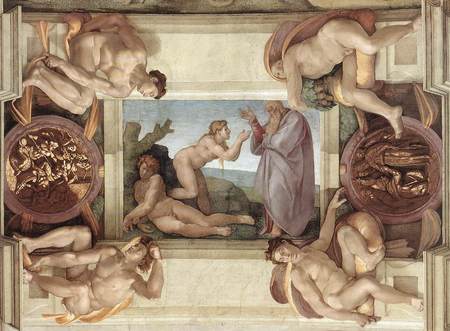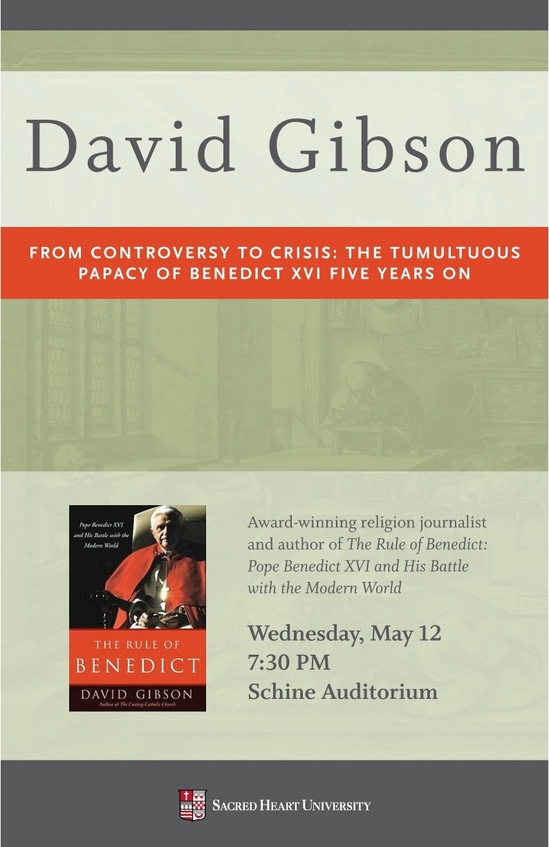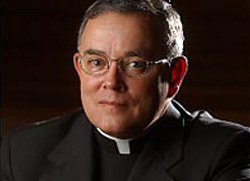Claudia McDonnell’s article in the Catholic New York, “Faith and Reasoning,” gives a digest of the talk and issues.
Category: Faith & Reason
David Gibson, a papal biographer to speak at Sacred Heart Univ May 12
Church of the ‘Times’
Thanks to Gary Stern at Blogging Religiously for bringing the recent Kenneth Woodward article, “Church of the ‘Times‘” to my attention. Commonweal magazine will be publishing a print edition of this article in the May 7, 2010 edition. Woodward’s perspective is just one among many, but does it have merit????
“Why I am a Catholic?” is a good question to ask
McGill University professor of History John Zucchi, Canada’s national leader for Communion and Liberation, asks the provocative question in a brief essay, “Why I am a Catholic.” John is a great guy, he’s serious about his faith and he’s sensitive to the movement of the Holy Spirit, but no one would claim he’s a mediocre follower of Christ. The claims of faith in Christ, Zucchi tells us, have to have two criteria borrowing from Luigi Giussani: faith in Christ has to be reasonable and it has to broaden my humanity, a gift given by God Himself. Reason and humanity lead to and exude Mercy. Paraphrasing Cardinal Ratzinger in God and the World, to be a Christian means that you are sympathetic toward one’s humanity that of another; a Christian is accepting of one’s injuries and within these wounds a deeper healing is found.
Anti-Catholicism, Again: a deeper look into clergy sex abuse
Joseph (Jody) Bottum, Editor of First Things and a contributing editor at the Weekly Standard, wrote what may go down as THE best essay on the sex abuse crisis facing the Catholic Church in the current issue of the Weekly Standard, “Anti-Catholicism: The permanent scandal of the Vatican” (May 3, 2010). Bottum’s piece is long but it’s worth a thorough read. For those looking for the print edition, the article hit the news stands on Saturday in most places but the link is noted above.
MedConference: Medical Care and the Person: The Heart of the Matter
 The MedConference is a three-day medical conference open to physicians, nurses and students of medical and nursing schools.
The MedConference is a three-day medical conference open to physicians, nurses and students of medical and nursing schools.
Some nuns are against bishops in support of Obama’s healthcare bill
Yesterday, Network: A National Catholic Social Justice Lobby, released a letter in support of Obama’s bill (HR 3590) to overhaul US healthcare. Obama proposal and the bill put forward is morally flawed.
Seminary and Sex
 Sexuality is a beautiful part of being human and it is a gift from God that needs to be known, understood, appreciated and embraced (no pun intended). Sexuality is a holy part of being a man or a woman. Unfortunately, that’s not the message we receive in secular society and it is infrequently heard from the pulpit in Catholic churches and very likely not in other Christian communities. Unheard of from the pulpit, that is, until Pope John Paul II introduced his monumental work, Theology of the Body. But that’s a topic for another time. Sexuality is not just a religious issue, it is a human issue and everything human is of our interest.
Sexuality is a beautiful part of being human and it is a gift from God that needs to be known, understood, appreciated and embraced (no pun intended). Sexuality is a holy part of being a man or a woman. Unfortunately, that’s not the message we receive in secular society and it is infrequently heard from the pulpit in Catholic churches and very likely not in other Christian communities. Unheard of from the pulpit, that is, until Pope John Paul II introduced his monumental work, Theology of the Body. But that’s a topic for another time. Sexuality is not just a religious issue, it is a human issue and everything human is of our interest.
Cardinal George’s address to BYU
Cardinal Francis E. George, OMI, Archbishop of Chicago and President of the US Conference of Catholic Bishops, spoke to more than 12,000 people at BYU in Salt Lake City on February 23, 2010. His full address, “Catholics and Latter-Day Saints: Partners in the Defense of Religious Freedom,” is found here: Cardinal George to BYU 2010.pdf.
Challenging the well-manicured: Archbishop Chaput takes a look at our cultural engagement
Someone who “gets it” is Capuchin Franciscan Archbishop Charles Chaput, archbishop of Denver. Whether it be culture, beauty, healthcare, abortion, immigrant rights, education, politics, preaching, I think the archbishop is a clear thinker and renders a fine and helpful assessment of Christian life and a Christians involvement in the world. Recently, Archbishop Chaput was in Rome to give a talk he titled, “The Prince of This World and the Evangelization of Culture” at the Fifth Symposium Rome: Priests and Laity on Mission. In this address the archbishop addresses questions of culture, beauty, anthropology, faith, evangelization and sin and grace.
What follows is only an excerpt of a longer talk that you can read at the link above. AND I recommend you read the entire text!
In 1929, as the great totalitarian murder-regimes began to rise up in Europe, the philosopher Raissa Maritain wrote a forgotten little essay called “The Prince of This World.” It is worth reading. We need to remember her words today and into the future. With no trace of irony or metaphor, Maritain argued:
“Lucifer has cast the strong though invisible net of illusion upon us. He makes one love the passing moment above eternity, uncertainty above truth. He persuades us that we can only love creatures by making Gods of them. He lulls us to sleep (and he interprets our dreams); he makes us work. Then does the spirit of man brood over stagnant waters. Not the least of the devil’s victories is to have convinced artists and poets that he is their necessary, inevitable collaborator and the guardian of their greatness. Grant him that, and soon you will grant him that Christianity is unpracticable. Thus does he reign in this world.”
If we do not believe in the devil, sooner or later we will not believe in God. We cannot cut Lucifer out of the ecology of salvation. Satan is not God’s equal. He is a created being subject to God and already, by the measure of eternity, defeated. Nonetheless, he is the first author of pride and rebellion, and the great seducer of man. Without him the Incarnation and Redemption do not make sense, and the cross is meaningless. Satan is real. There is no way around this simple truth.
Let me underline that even more strongly. Leszek Kolakowski, the former Marxist philosopher who died just last year, was one of the great minds of the last century. He was never a religious person in the traditional sense. But Kolakowski had few doubts about the reality of the devil. In his essay Short Transcript of a Metaphysical Press Conference Given by the Demon in Warsaw, on 20th December 1963, Kolakowski’s devil indicts all of us who call ourselves “modern” Christians with the following words:
“Where is there a place [in your thinking] for the fallen angel? … Is Satan only a rhetorical figure? . . . Or else, gentlemen, is he a reality, undeniable, recognized by tradition, revealed in the Scriptures, commented upon by the Church for two millennia, tangible and acute? Why do you avoid me, gentlemen? Are you afraid that the skeptics will mock you, that you will be laughed at in satirical late night reviews? Since when is the faith affected by the jeers of heathens and heretics? What road are you taking? If you forsake the foundations of the faith for fear of mockery, where will you end? If the devil falls victim to your fear [of embarrassment] today, God’s turn must inevitably come tomorrow. Gentlemen, you have been ensnared by the idol of modernity, which fears ultimate matters and hides from you their importance. I don’t mention it for my own benefit – it is nothing to me – I am talking about you and for you, forgetting for a moment my own vocation, and even my duty to propagate error.”
We live in an age that imagines itself as post-modern and post-Christian. It is a time defined by noise, urgency, action, utility and a hunger for practical results. But there is nothing really new about any of this. I think St. Paul would find our age rather familiar. For all of the rhetoric about “hope and change” in our politics, our urgencies hide a deep unease about the future; a kind of well-manicured selfishness and despair. The world around us has a hole in its heart, and the emptiness hurts. Only God can fill it. In our baptism, God called each of us in this room today to be his agents in that work. Like St. Paul, we need to be “doers of the word, and not hearers only” (Jas 1:22). We prove what we really believe by our willingness, or our refusal, to act on what we claim to believe.
But when we talk about a theme like today’s topic – “Priests and laity together, changing and challenging the culture” – we need to remember that what we do, proceeds from who we are. Nothing is more dead than faith without works (Jas 2:17); except maybe one thing: works without faith. I do not think Paul had management issues in his head when he preached at the Areopagus. Management and resources are important – but the really essential questions, the questions that determine everything else in our life as Christians, are these: Do I really know God? Do I really love him? Do I seek him out? Do I study his word? Do I listen for his voice? Do I give my heart to him? Do I really believe he’s there?
For more than 30 years, first as a bishop and now as the successor to St. Peter, Benedict XVI has spoken often and very forcefully about the “culture of relativism” that guides today’s developed world, breaks down human community and intimacy, and drains the meaning out of human activity. That culture flows out of the “new Areopagus” John Paul II described in Redemptoris Missio – a culture formed by radically new technologies and methods of communication; a culture with a power that reshapes how we think, what we think about, and how we organize our personal and social lives.
We have an obligation as Catholics to study and understand the world around us. We have a duty not just to penetrate and engage it, but to convert it to Jesus Christ. That work belongs to all of us equally: clergy, laity and religious. We are missionaries. That is our primary vocation; it is hardwired into our identity as Christians. God calls each of us to different forms of service in his Church. But we are all equal in baptism. And we all share the same mission of bringing the Gospel to the world, and bringing the world to the Gospel.

